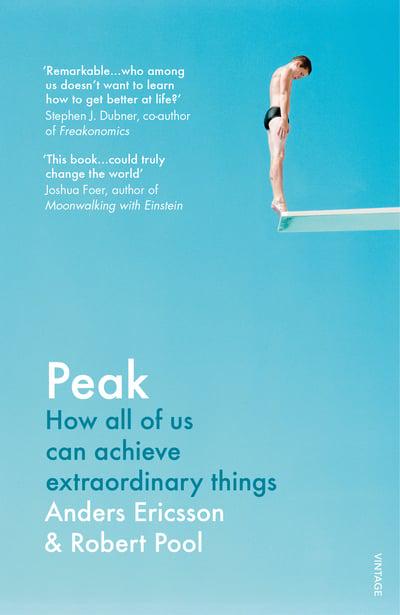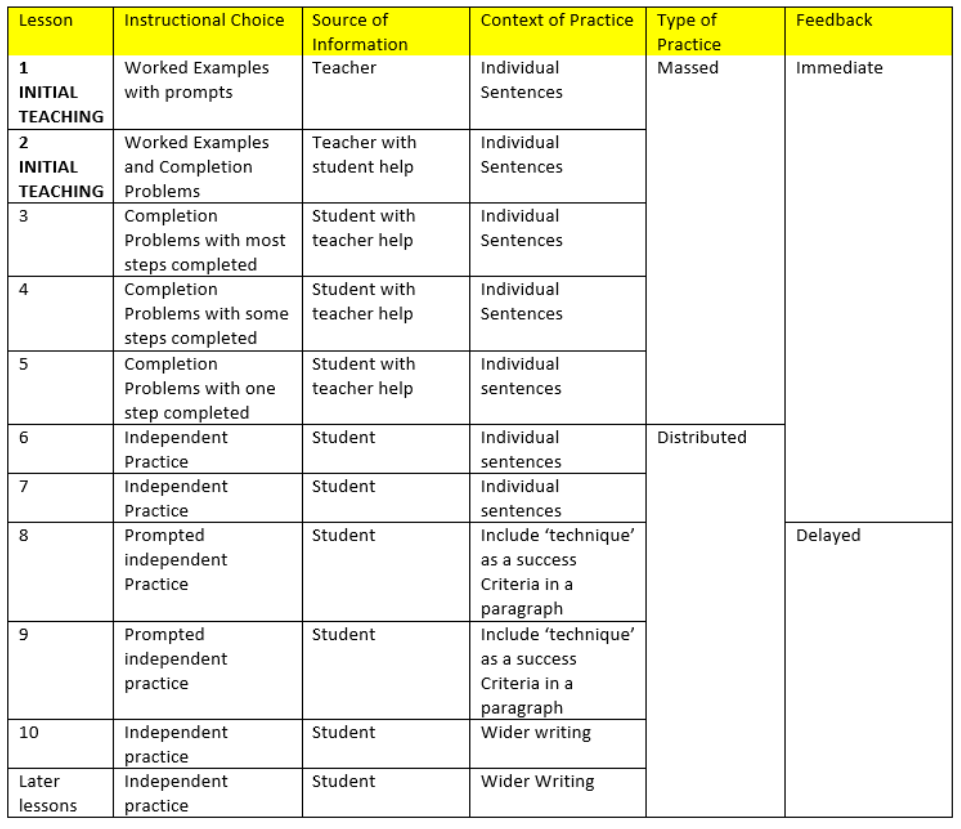One of the main goals of teaching English is to help pupils become better at writing. Expert writers seem to be able to write with minimal effort. They write quickly, accurately and effectively, their sentences well-constructed, their ideas expressed with clarity, producing texts that appeal to the reader whilst also being suited perfectly to the task at hand. This is, however, no easy feat: expert writing involves the control of cognitive, perceptual and motor processes, each of which has become relatively effortless, most likely through extended and deliberate practice.
Deliberate practice can help to reduce the attentional demands of particular processes. Simple perceptual-motor processes can, through deliberate practice, become completely effortless. If you have ever trained in a particular sport, you will recognize this process of automisation. I play football and, as a result of sustained deliberate practice, do not have to think about the position of my feet, the angle of my leg or where my foot will meet the ball when kicking. Someone who has never kicked a ball before will need to concentrate on all of these things. The sheer number of things to consider (and we haven’t even talked about positioning or anything to do with other players) will mean that this may be a difficult task to execute proficiently and consistently. Writing, however, is not a simple perceptual-motor process and in my last post, I attempted to outline its complexity. Because of this complexity, effective writing instruction should seek to reduce rather than entirely eliminate the relative effort required for each of the components and processes involved.
Deliberate practice can do exactly that. By reducing the attentional demands on the components, it can free up pupil’s attention so that they can concentrate on the whole performance, allowing them to respond flexibly and effectively to the task at hand.
Real Life Case Studies
Isaac Asimov, one of the most distinguished and prolific writers of science fiction, wrote almost 500 books in a career that spanned more than 40 years. A study (Ohlsson 1992) explored Asimov’s writing career in an attempt to draw inferences regarding the effects of practice. The study split his oeuvre into groups of 100 books. Although the books would obviously vary in length and complexity, the researchers assumed that this would roughly average out. Asimov completed his first 100 books in 237 months; his second 100 books in 113 months; his third 100 books in 69 months and his fourth in 42 months. His writing sped up significantly as his career progressed and it seems reasonable to attribute this improvement to practice and increasing expertise.
A second study (Raskin 1936) found that scientists and authors produced their best work in their mid-30s, ten years or so after their first publications. In a study of poets (Wishbow 1998), researchers found that over 80% of 66 poets that were listed in the Norton Anthology of Poetry were first published ten years after starting reading and writing poetry. Both of these studies can also be seen as lending support to the idea that practice is beneficial.
Defining Practice
We are all familiar with the general meaning of practice, perhaps equating it to sustained effort or repetition, but what else is required to ensure that practice is maximally effective. In his brilliant book ‘Peak’, Anders Ericsson, the world’s leading expert on deliberate practice, explains that if practice is to be an effective means of developing expertise, it needs to ‘purposive’ or ideally ‘deliberate’. Let’s have a look at each one in turn.

Purposive Practice
- Well defined, specific goals
Teachers should choose goals that are suited to their student’s current level of expertise. If their pupils are struggling with transcription, then asking them produce extended pieces of writing will not be the best instructional choice. It will be more useful to build their transcriptional fluency, perhaps through systematic spelling instruction, dictation activities or short, timed writing practice.
A pupil’s level of writing expertise is unlikely to be the same across genres or different types of tasks. Expertise is often very narrow and highly domain specific. When pupils enter year 7, they are often pretty good at writing stories, having learned and practiced this text type a lot during primary school. Although they are adept at writing narratives, they are usually relative beginners or even complete novices at writing analytically. Because of this, it will probably not be a good idea to expect them to write essays that are of a comparable length to their creative pieces. Instead, instruction and practice should be focused at the sentence and paragraph level, building fluency with these components with the eventual aim of creating fluency in the wider, composite task of writing text response essays.
2. Putting a bunch of baby steps together to reach a longer term goal
Although the goal may be fluent and proficient extended compositions, the best way to achieve this is likely to involve practicing the components that build up the composite whole. Designing restrictive practice activities that focus on isolated components can be really helpful.
3. Focus and Attention
If pupils aren’t concentrating or paying attention, then it doesn’t matter how good we think we our lesson is, they won’t get better at writing. Mike Hobbis explains some of the research into attention in this post
4. Feedback
In Peak, Ericsson points out that ‘meaningful positive feedback is crucial for motivation……..this can be internal feedback such as the satisfaction of seeing yourself improve at something, or external feedback provided by others’
To prevent errors from becoming ingrained, in the initial stages of instruction, corrective feedback should be immediate. Effective feedback requires the giver to have a well-developed mental representation of what is being performed. If a task is vague, then this can makes things difficult. Feedback involves comparing these expert mental representations to the performance: the difference is what the student needs to do to improve.
5. Getting out of your comfort zone
Purposive practice should involve a level of challenge that is just above pupils’ current performance levels. It should be achievable yet challenging and this is often a hard balance to achieve. Rosenshine’s principles of Instruction, based upon the product-process research, would point to 80% as being an optimum success rate for pupils: on average, pupils should be getting 80% of the answers correct in a lesson. Too easy and pupils may lose interest; too hard and pupils may give up. They need to see that if they devote sustained attention to the task, that the goal is achievable. Asking pupils to write answers to GCSE exam questions in year 7 is unlikely to strike this balance.
Deliberate Practice
Deliberate practice requires that teachers ‘set practice activities designed to help pupils improve’. In order to create such activities, the teacher will need to follow a number of guidelines:
- Teachers must know what makes up expert writing
Deliberate practice is different from other forms of practice because it requires a fairly well established domain where ‘the best performers have attained a level of performance that clearly sets them apart from people who are just entering the field.’ Writing seems to fit this description. Although there will be huge variations in style, tone, register and form across expert writing, even within a specific genre or text type, expert writers will likely have utilized similar cognitive processes in order to create their pieces. Deftly juggling mental representations that span author, text and prospective readers, they will have recursively planned, composed and reviewed their writing. These processes can be isolated and practiced with students and these mental representations can be incrementally developed too, through extensive reading and studying models. Pupils should also be taught and asked to apply specific sentence structures or literary techniques.
How can this be achieved:
- Practice, practice practice! Teachers should regularly be practicing writing themselves by completing the same tasks that pupils are asked to do. Almost every time pupils write, I write as well.
- Reading, analyzing and discussing student work with colleagues
2. They must understand the relationship between components and wholes
Extended writing, like most other complex cognitive or physical skills, can be split up into different components, each of which can be taught and practiced in isolation before being combined into increasingly complex wholes. There are many advantages to this approach and it is no surprise that drills and restrictive practice tasks are standard in sports training and music teaching. Drills allow initial massed practice so that pupils, through immediate corrective feedback, are able to perform accurately. These drills can then be distributed over time so that pupils retain the skill and, once the desired level of accuracy has been reached, pupils can begin to work on their fluency by attempting to complete trials within a specific time limit. If pupils become fluent in these components, they are far more likely to be able to use them in wider writing.
Practising sentence structures on their own, however, is unlikely to be very successful. Pupils need to eventually use these components in their wider writing and an effective instructional sequence will gradually shift from restrictive practice to wider application. Something like this:

How can this be achieved:
- Components should be chosen and sequenced based on their utility-anaphora may well be more useful to pupils than anastrophe.
- Components should be chosen that are easily combined with others: specific high utility sentence structures are ideal here.
- Particular attention should be paid to the shift from drills to wider application so that pupils are able to apply what they have practiced in extended writing. If not, pupils will not transfer their knowledge to wider writing. Transfer is notoriously difficult to achieve, although one method of achieving it is to make pupils aware of the similarity between different contexts or tasks. This can be achieved through prompts, success criteria and asking pupils to underline the components that they have included in their writing.
- Ensure that there is a suitable balance between practicing components and appropriate extended writing. Most of the time, classes should be doing both: drills to develop accuracy and fluency; extended writing to push pupils thinking about the content as well as to combine and apply fluent components. If pupils only complete drills, this will only help them get better at drills and they may not transfer this knowledge to extended writing. If pupils only do extended writing, this is unlikely to accelerate their progress as much as balancing the two.
If you are interested, many of the ideas in this post are based on ‘Training Advanced Writing Skills: The Case for Deliberate Practice‘ by Ronald T Kellogg and Alison T Whiteford.
Next Post: Reading and Writing: A Reciprocal Relationship
